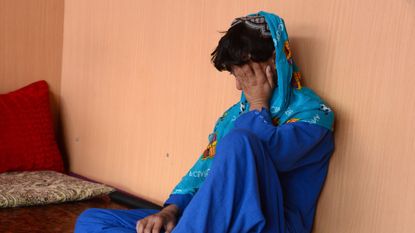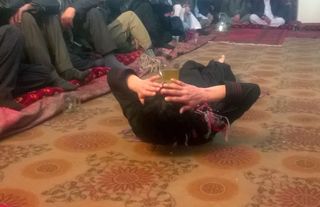Bacha bazi: the scandal of Afghanistan’s abused boys
Tradition of ‘boys for play’ facing scrutiny following exposure of paedophile ring operating in schools

Afghanistan’s attorney general has launched an investigation into allegations that more than 500 schoolboys were abused by a paedophile ring in the country’s Logar province.
The scandal was sparked by the discovery of a Facebook page featuring more than 100 videos showing the alleged abuse of boys in six schools by teachers, headteachers and other authority figures.
The Afghan Ministry of Education has launched an urgent investigation amid “a national debate on child abuse involving members of parliament and civil society”, says The Guardian.
Subscribe to The Week
Escape your echo chamber. Get the facts behind the news, plus analysis from multiple perspectives.

Sign up for The Week's Free Newsletters
From our morning news briefing to a weekly Good News Newsletter, get the best of The Week delivered directly to your inbox.
From our morning news briefing to a weekly Good News Newsletter, get the best of The Week delivered directly to your inbox.
The scandal has also shone the spotlight on a much-criticised tradition known as bacha bazi, with renewed calls for government action to end the practice.
What happened?
The Facebook page at the centre of the allegations was exposed by civil society organisation the Logar Youth, Social and Civil Institution.
The Guardian reports that the two activists who revealed the abuse featured in the videos have since been forced to leave the country with their families.
Both received death threats before publishing their research, and were detained by the National Directorate of Security. The pair were held by the intelligence agency for several days and were only released after “publicly denying their findings”, according to the newspaper.
Following an international outcry over the reports, a spokesperson for the attorney general’s office this week announced that a committee has been appointed to look into the allegations.
“We are in the process of running a comprehensive, impartial investigation,” the spokesperson said.
Government officials said the Ministry of Education is also drafting a school security plan to deal with issues including how to tackle child abuse claims.
Is such abuse common in Afghanistan?
The abuse of young boys in Afghanistan is systemic under the centuries-old tradition of bacha bazi, which literally translates as “boy for play”.
The practice was banned under the Taliban, who implemented a strict form of sharia law. However, “it has crept back and is now widespread, flourishing in the cities, including the capital, Kabul”, according to The Guardian.
In an article for Foreign Policy magazine, US Department of State analyst Chris Mondlock says the so-called bacha boys - many of whom have been kidnapped or bought from their families - are forced to perform as dancers at private parties and weddings. They are “often made to dress as females [and] wear make-up”, he adds.

Boy performs at a party in an unidentified location in Afghanistan
The boys are owned by single or married men, who keep them in a form of sexual slavery, like concubines. Yet the practice is not seen as homosexuality, The Independent reports.
The newspaper says that according to the social norms of Afghanistan’s Pashtun culture, “bacha bazi is not un-Islamic or homosexual at all - if the man does not love the boy, the sexual act is not reprehensible, and is far more ethical than defiling a woman”.
The Guardian says the boys are usually “released at the age of 19, when they can get married and reclaim their status as ‘male’”. But many struggle to throw off the stigma of having been a bacha boy and to cope with the psychological effects of the abuse they have suffered.
Writing for Foreign Policy, Mondloch says: “Demeaning and damaging, the widespread subculture of paedophilia in Afghanistan constitutes one of the most egregious ongoing violations of human rights in the world.”
According to The New York Times, US troops stationed with allied Afghan forces to fight against the Taliban were “instructed not to intervene” in the abuse of young boys.
Former Special Forces captain Dan Quinn told the paper that he was relieved of his command after beating up a US-backed militia commander for keeping a boy chained to his bed as a sex slave.
–––––––––––––––––––––––––––––––For a round-up of the most important stories from around the world - and a concise, refreshing and balanced take on the week’s news agenda - try The Week magazine. Start your trial subscription today –––––––––––––––––––––––––––––––
What next?
The Guardian reports that while Afghan authorities and non-governmental organisations are aware of the plight of the bacha boys, both “seem powerless to stop it”.
The chair of the Independent Human Rights Commission, Shaharzad Akbar, told the paper that as well as a “global culture of shame of the abused”, Afghanistan also has a culture of “moving people with allegations to different offices or provinces as a form of ‘punishment’”.
US foreign affairs analyst Mondloch argues that the only way to combat the bacha bazi tradition is to “modernise Afghanistan’s rule of law system”. However, reforms to Afghanistan’s penal code in 2018 have done little to stem the abuse.
In December, the European Parliament called on the Afghan authorities to “set up a national victim support helpline dedicated to children’s rights abuses”, and to launch a “nationwide campaign to educate the general public about the prohibition of bacha bazi”.
As yet, no such plans have been announced.
Create an account with the same email registered to your subscription to unlock access.
Sign up for Today's Best Articles in your inbox
A free daily email with the biggest news stories of the day – and the best features from TheWeek.com
-
 Is the Gaza war tearing U.S. campuses apart?
Is the Gaza war tearing U.S. campuses apart?Today's Big Question Protests at Columbia University, other institutions, pit free speech against student safety
By Joel Mathis, The Week US Published
-
 DOJ settles with Nassar victims for $138M
DOJ settles with Nassar victims for $138MSpeed Read The settlement includes 139 sexual abuse victims of the former USA Gymnastics doctor
By Justin Klawans, The Week US Published
-
 14 recent scientific breakthroughs
14 recent scientific breakthroughsIn Depth From photos of the infant universe to an energy advancement that could save the planet
By Devika Rao, The Week US Published
-
 The #MeToo movements around the world
The #MeToo movements around the worldThe Explainer French men have been sharing stories of abuse in the latest calling out of sexual assault and harassment
By The Week Staff Published
-
 Rape in the metaverse: a case for the real-life police?
Rape in the metaverse: a case for the real-life police?Talking Point Investigation launched into attack on girl in virtual reality game amid warnings that sexual offences 'rife' in online worlds
By Harriet Marsden, The Week UK Published
-
 Journalists in UK courts: question of transparency?
Journalists in UK courts: question of transparency?Under the radar Proposed changes to justice system include excluding reporters from rape and sexual assault trials
By Harriet Marsden Published
-
 Russell Brand: trial by media?
Russell Brand: trial by media?Comedian denies accusations of sexual assault and rape in joint media investigation
By The Week Staff Published
-
 ‘I’m a big flirt’: Kevin Spacey begins defence in sexual assault trial
‘I’m a big flirt’: Kevin Spacey begins defence in sexual assault trialSpeed Read Jurors are seeing star ‘close up’ and ‘fighting for his innocence’
By Chas Newkey-Burden Published
-
 Colin Pitchfork: justice secretary attempts to halt killer’s release
Colin Pitchfork: justice secretary attempts to halt killer’s releaseSpeed Read The double child-murderer has been in and out of prison following a series of parole decisions
By Rebekah Evans Published
-
 Gary Glitter back in prison amid ‘dark web’ allegations
Gary Glitter back in prison amid ‘dark web’ allegationsSpeed Read The paedophile singer was released in February after serving half of his sentence for sexually abusing three girls
By Ellie Pink Published
-
 Man arrested in Scotland is missing US fugitive Nicholas Rossi, court rules
Man arrested in Scotland is missing US fugitive Nicholas Rossi, court rulesSpeed Read Edinburgh court says rape suspect’s claims are ‘scandalous’ and ‘entirely fanciful’
By The Week Staff Published